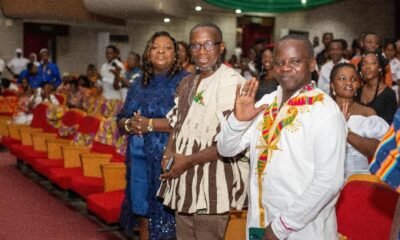Features
On Visual Arts education

I recently read a news item about visual arts education in Ghana that said a cross-section of visual arts students in the Ashanti Region welcomed the introduction of a pre-engineering programme as an opportunity to express their creative skills.
The story further said that to the students, the programme offers a unique opportunity to correct the erroneous impression that Visual Arts is meant for those who are academically weak.
This piece of information left me considering what Visual Arts education is like, at least, in Finland, if not other European countries.
The Visual Arts education in Finland
In Finland, there are around 40 universities, including 10 major and multidisciplinary ones like the University of Helsinki.
From this number, there are four specialised universities, including the Hanken School of Economics and the University of the Arts, Helsinki (Uniarts).
This University of the Arts, Helsinki, is the most known that is devoted to visual arts education. According to information on its website, the University of the Arts, Helsinki, provides the highest level of education in music, fine arts, theatre and dance in Finland.
It is an international forerunner in education and research in the field of arts, and strengthens the role of art as a force that reforms society. Established in 2013, Uniarts Helsinki consists of the Academy of Fine Arts, Sibelius Academy and Theatre Academy (see, https://www.uniarts.fi/en/).
Study programmes
The University of Arts, Helsinki offers degree and other areas of study. Students can study programmes such as printmaking, painting, sculpture, moving image, and photography.
For example, the Finnish Academy of Fine Arts offers education in sculpture, the moving image, painting, contextual art, graphics arts and photography.
The Sibelius Academy, named after the world famous Finnish composer, Jean Sibelius, is a school for music. At the Sibelius Academy, students can study church music, classical music performance, etc. The Theatre Academy is devoted to studies in theatre performances such as acting, directing and dramaturgy.
The university offers the bachelor’s, master’s or doctoral programmes and non-degree studies. It has become quite international.
Learning from Finland
Why am I writing about all this? The answer is simple. I simply admire Finland’s emphasis on fine arts or visual arts education, which also indicates that there is a move away from too much emphasis on theoretical subjects to the neglect of the practical ones.
I think we can learn from the Finnish model and establish at least a university like the University of the Arts, Helsinki, with Academies such as a music academy, if this is not already thought about.
I think this can easily be done, bringing together some institutions to form such a university in Ghana. I will even suggest that such an academy of music can be named after our own late famous composer Ephraim Amu, just as Finland has a music academy named after their own Jean Sibelius. (Here, I am also thinking about the internationalisation advantage).
The National Academy of Music (NAM) at Winneba may have become part of the larger University of Education, Winneba. But, I think there are other such institutions that can easily be turned into the University of the Arts following the Finnish model.
I think there are also theatre institutions which can easily be turned into an academy as part of a university of the arts in Ghana. Thank you!
Features
A focus on Apostle Francis Owusu Kwaah, National Head of COP Finland

Apostle Owusu Kwaah
Today, I focus on Apostle Francis Owusu Kwaah, the National Head of the Church of Pentecost (COP) in Finland,as I continue with my narration of personalities and their accomplishments as members of the Ghanaian Diaspora in Finland.
The Church of Pentecost in Finland has made great contributions to the positive interactions among Ghanaian migrants in Finland and their integration into the Finnish society.
Apostle Owusu Kwaah arrived in Finland on 22 November 2020 and took up the position as the National Head of COP in Finland, taking over from Apostle Edmund Appiah whothen moved to the UK.
Assumption of duty
Having assumed office as the National Head of COP Finland, Apostle Owusu Kwaah hasundoubtedly continued with work for the growth of the church.He has respectfully held the position and has been leading the church in great strides.
Indeed, the COP Finland has played a prominent role in the religious or spiritual existence of its members, as well as in people’s social lives as a key aspect of integration into the Finnish society.
The Church in Finland was established over 20 years ago, havingbeen started in September 2000 as a prayer group with a small number of devoted persons in Helsinki (see www.copfinland.fi).
Achievements as Head of COP Finland
There is no denying the fact that under Apostle Owusu Kwaah as the National Head of COP Finland, the church has continued to chalk significant progress, as started under Apostle Kwaah’s predecessor, Apostle Appiah.
The COP has seen significant growth, including re-organising the Vaasa branch of the church, while other branches were opened in Turku and Tampere. A nursery assembly was also started in Oulu.
An innovative Online Church was also established during the Covid-19 period. Thisenabled members of the church to still worship (especially on Sundays) in view of the lockdowns, while the online church service also catered especially for people scattered around Finland.
As mentioned earlier, all achievements have continued under Apostle Francis Owusu Kwaah after he took over from Apostle Appiah.Like his predecessor Apostle Appiah, Apostle Owusu Kwaah has made many innovative moves, as he continues with the achievements begun by his predecessor.
Today, under Apostle Owusu Kwaah, a youth branch of COP has recently been established in Espoo, a part of the greater Helsinki region in Finland. New branches of the church have also been opened in Kuopio and Joensuu, both of which are cities in eastern Finland.
The COP Finland continues to grow under Apostle Owusu Kwaah’s ministration. He has also spearheaded the establishment of an innovative online prayer session, called “Prayer Clinic”, every Saturday morning which is open to everyone irrespective of their religious background and who wants to be in the presence of God.
New Deacons, Deaconesses, and Elders have recently been appointed to take up leadership roles in various aspects in the many branches of the church.
The future of COP in Finland
During my interview with Apostle Owusu Kwaah, I got a very positive impression about his vision for the growth and development of COP in Finland.
Indeed there is no doubt that Apostle Owusu Kwaah is optimistic and has a very positive view of the Church and the future of COP in Finland.
The Apostle is thankful to the many people whose support and encouragement has undoubtedly helped in his religious work for the church and its growth in Finland.
Role in the Ghanaian community
COP Finland has been one of the major channels through which the Ghana Union Finland (GUF), an association for Ghanaian migrants in Finland, has made more contacts with members of the Ghanaian community. It is one of the major Pentecostal or Charismatic churches dominated by Ghanaian migrants and which has been of immense benefit to GUF.
Previously, before the Covid-19 pandemic from March 2020 and its attendant restrictions, newly-elected executives of GUF got the chance to introduce themselves to other Ghanaian migrants by visiting them at church sessions. This boosted easy interaction.
Moreover, the church in Helsinki has the Akan Assembly where worship is done mainly in the Twi language, and the English Assembly (or the PIWC) attended by other nationalities and African migrants aside Ghanaian migrants. Thank you!
Email: perpetual.crentsil@yahoo.com
By Perpetual Crentsil
Features
Things are walking over us -Part 1
I write as I am led by my instincts which invariably is controlled by God’s Holy Spirit which dwells within me.
I am therefore being motivated to wear my preacher’s cap this week to address an issue which I believe agitates the minds of many believers.
Many people have doubts about the authenticity of the Bible due to the level of poverty amongst believers as well as lack of many Christians being at the commanding heights of business, governance and organisations in society contrary to what the Bible teaches.
When you enter into a rich man’s home in his absence and if the wife is also not around, usually, it is the steward or house help who is in charge of affairs, that is if the children in the house are very young.
Instead of the children being in charge of affairs, due to lack of knowledge, the house help takes charge of affairs in the house. This is the reason why although the word of God makes it clear that Christians are to be in charge in all spheres of life, the reverse is the case.
The richest man in the world currently is not a Christian. In fact, a study conducted by an organisation called New World Wealth revealed that out of the 13.1 millionaires in the world, just about 56.2 per cent are Christians contrary to the expectation that overwhelming majority should be Christians.
The cause of this seemingly contradictory occurrence from what the Bible portrays is the lack of understanding of the scriptures, specifically Genesis Chapter 1 verses 26 and 27 which states, “And God said let us make man in our image, after our likeness: and let them have dominion over the fish of the sea, and over the fowl of the air, and over the cattle, and over all the earth, and over every creeping thing that creepeth upon the earth. So God created man in his own image, in the image of God created he him; male and female created he them.”
The lack of understanding of these scripture verses is the basis for the inability of Christians to fulfill the dominion mandate that God purposed for believers. When the Bible says image and after our likeness, it does not mean a picture i.e. that when a man or woman looks in a mirror, what she or he sees is what God looks like.
It rather refers to the nature of God and the attributes. God expects human beings to express love, compassion, patience among others and more importantly, to exercise control or dominion on earth through his power that he made available to Adam and Eve when God created them. That was God’s original purpose and it has not changed.
When the first humans disobeyed God through the influence of Satan, man as in male and female, became corrupted and lost some of the power to exercise dominion as well as to fully exhibit the attributes of God.
Sin brought with it wicked thoughts and deeds and that was why Cain was able to murder his brother Abel as a result of anger and bitterness. The descendants of Cain who are popularly referred to as the line of wickedness brought the marrying of two or more wives and, hence side-chics.
God wishing for his original purpose for mankind to be restored, then hatched a plan resulting in the coming of Jesus that mankind through him would be restored to our original state in the Garden of Eden.
Christians therefore through the Holy Spirit are imbued with creativity which is an attribute of God and are uniquely placed to be innovative so that they can create things and provide services that people need to enable them control the commanding heights of industry, governance technology and more importantly spiritual realm.
By Laud Kissi-Mensah





